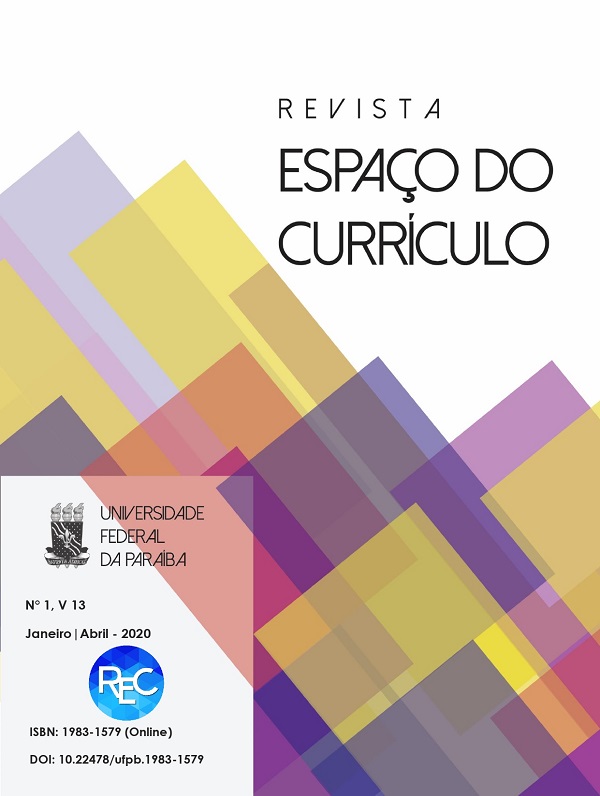ETHNOMATEMATICS AND THE CURRICULUM
learning in the context of a mathematic game
DOI:
https://doi.org/10.22478/ufpb.1983-1579.2020v13n1.43974Keywords:
Games, Ethnomathematics, CurriculumAbstract
This article aims to reflect on the potential of games for the implementation of educational practices based on ethnomathematics. To this end, we start from our academic and classroom experiences and the educational assumptions defended by this field of research, discuss the curricular importance of games, in the light of this perspective, and identify potentialities in these resources compatible with the pedagogical proposal of d’ambrosiana. Finally, we show that the game favors the emergence of different forms of mathematical knowledge / making, allows the manifestation of signs representative of specific societies and contexts, allows the construction of school knowledge from the students' daily life and the use of different knowledge of the historically hegemonic in schools. Therefore, they are potentially capable of promoting the implementation of ethnomathematical educational practices.
Downloads
Metrics
References
BOGDAN, Robert; BIKLEN, Sari. Investigação qualitativa em educação: uma introdução à teoria e aos métodos. Porto editora, 1994.
BRASIL. Ministério da Educação. Base Nacional Comum Curricular. Brasília: MEC, 2018. Disponível em:<http://basenacionalcomum.mec.gov.br/download-da-bncc>. Acesso em: 14 set. 2018.
BRASIL, Ministério da Educação. Secretaria de Educação Básica. Orientações curriculares para o ensino médio/ Ciências da Natureza, Matemática e suas Tecnologias. Brasília, 2006.
BRASIL, Secretaria de Educação Básica. Parâmetros Curriculares Nacionais (2000). Parâmetros Curriculares Nacionais do Ensino Médio: Matemática e suas tecnologias. Brasília: Secretaria de Educação, 2000.
BRASIL, Secretaria de Educação Básica. Diretrizes Curriculares Nacionais Gerais da Educação Básica/ Ministério da Educação. Secretaria de Educação Básica. Diretoria de Currículos e Educação Integral. Brasília: MEC, SEB, DICEI, 2013.
BRASIL, Secretaria de Educação Fundamental. Parâmetros Curriculares Nacionais: Matemática / Secretaria de Educação Fundamental. Brasília: MEC /SEF, 1998.
D’AMBRÓSIO, Ubiratan. Da reflexão à ação: reflexões sobre educação e matemática. 2. ed. Campinas- SP: Editora da Universidade Estadual de Campinas, 1986.
_______. Educação Matemática: da teoria à prática. 17. ed. Campinas- SP: Papirus, 2009.
_______. Etnomatemática - elo entre as tradições e a modernidade. 5. ed. Belo Horizonte: Autêntica Editora, 2015.
_______. Etnomatemática: a arte ou técnica de explicar e conhecer. 5. ed. São Paulo: Editora Ática, 1998.
LUCAS, Leandro Mário. O 'Jogo da Onça': Uma interlocução entre o cotidiano e o ensino de adição e subtração de números decimais. 2018. 195f. Dissertação (Programa de Pós-Graduação em Ensino de Ciências e Educação Matemática - PPGECEM) - Universidade Estadual da Paraíba, Campina Grande, 2018.
MALTA, Shirley Cristina Lacerda. Uma abordagem sobre currículo e teorias afins visando à compreensão e à mudança. Espaço do currículo, v. 6, n. 2, p. 340-354, 2013.
SILVA, Tomaz Tadeu da. Documentos de identidade: uma introdução às teorias do currículo. 3 ed. Belo Horizonte: Autêntica Editora, 2013.
Downloads
Published
How to Cite
Issue
Section
License
By submitting an article to Curriculum Space Journal (CSJ) and having it approved, the authors agree to assign, without remuneration, the following rights to Curriculum Space Journal: first publication rights and permission for CSJ to redistribute this article. article and its metadata to the indexing and reference services that its editors deem appropriate.
















